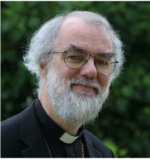In honor of the good King’s feast day today (in both the Catholic and Anglican calendars), I thought I’d post a bit.
Before the gods that made the gods
Had seen their sunrise pass,
The White Horse of the White Horse Vale
Was cut out of the grass.
Before the gods that made the gods
Had drunk at dawn their fill,
The White Horse of the White Horse Vale
Was hoary on the hill.
Age beyond age on British land,
Aeons on aeons gone,
Was peace and war in western hills,
And the White Horse looked on.
For the White Horse knew England
When there was none to know;
He saw the first oar break or bend,
He saw heaven fall and the world end,
O God, how long ago.

For the end of the world was long ago,
And all we dwell to-day
As children of some second birth,
Like a strange people left on earth
After a judgment day.
…
“The gates of heaven are lightly locked,
We do not guard our gold,
Men may uproot where worlds begin,
Or read the name of the nameless sin;
But if he fail or if he win
To no good man is told.
“The men of the East may spell the stars,
And times and triumphs mark,
But the men signed of the cross of Christ
Go gaily in the dark.
“The men of the East may search the scrolls
For sure fates and fame,
But the men that drink the blood of God
Go singing to their shame.
“The wise men know what wicked things
Are written on the sky,
They trim sad lamps, they touch sad strings,
Hearing the heavy purple wings,
Where the forgotten seraph kings
Still plot how God shall die.
“The wise men know all evil things
Under the twisted trees,
Where the perverse in pleasure pine
And men are weary of green wine
And sick of crimson seas.
“But you and all the kind of Christ
Are ignorant and brave,
And you have wars you hardly win
And souls you hardly save.
“I tell you naught for your comfort,
Yea, naught for your desire,
Save that the sky grows darker yet
And the sea rises higher.
“Night shall be thrice night over you,
And heaven an iron cope.
Do you have joy without a cause,
Yea, faith without a hope?”
…
“I know that weeds shall grow in it
Faster than men can burn;
And though they scatter now and go,
In some far century, sad and slow,
I have a vision, and I know
The heathen shall return.
“They shall not come with warships,
They shall not waste with brands,
But books be all their eating,
And ink be on their hands.
“Not with the humour of hunters
Or savage skill in war,
But ordering all things with dead words,
Strings shall they make of beasts and birds,
And wheels of wind and star.
“They shall come mild as monkish clerks,
With many a scroll and pen;
And backward shall ye turn and gaze,
Desiring one of Alfred’s days,
When pagans still were men.




Recent Comments